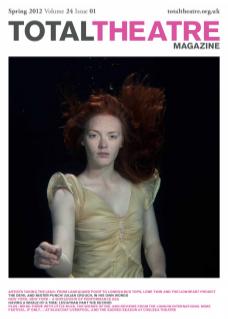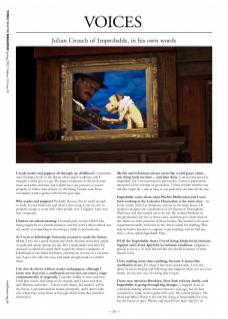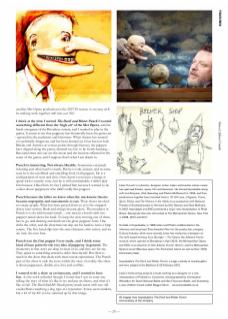I made masks and puppets all through my childhood. I remember once finding a book in the library about paper sculpture, and I thought I could give it a go. The paper sculptures in the book were clean and white and neat, but I didn’t have the patience to read it properly or follow instructions, so the things I made were from newspaper stuck together with brown gum tape.
Why masks and puppets? Probably because they’re small enough to make in your bedroom, and when I was young I was too shy to properly occupy a room with other people in it. I suppose I got over that eventually...
I had no art school training. I learned early on that I didn’t like being taught art in a formal situation, and the work I did at school was not nearly as compelling as the things I made in my bedroom.
So I went to Edinburgh University instead to study the history of art. I was not a good student and slowly became nocturnal, awake at night and asleep during the day. But I made masks and after I’d amassed a collection touted them round the theatre companies of Edinburgh in two black bin liners, offering my services at a cut price rate. I got a few jobs this way, and made enough masks to exhibit them.
I do also do shows without masks and puppets, although I know now that even a cardboard cut-out tree can enter a stage enthusiastically or tragically. I actually dabble in most artforms. I still play music, and compose for theatre, and I paint and draw and illustrate and write… I don’t really dance, but maybe I will in the future. I am interested in stories principally, and I don’t really care where they come from or through which form they manifest themselves.
My life and influences always seem like a wild goose chase… one thing leads me here… and then there. I am not interested in originality, but I am interested in personality. I am not particularly interested in the worship of good ideas. I often wonder whether any old idea might do – just as long as you push that one idea all the way.
Improbable came about when Phelim McDermott and I were both working at the Leicester Haymarket at the same time – he in the studio (with Lee Simpson), and me in the main house. He needed a designer for a production of Dr Faustus at Nottingham Playhouse and that turned out to be me. We worked freelance in the rep theatres for two or three years, and then got a little tired of the ‘bums on seats’ pressure of those houses. We wanted to do more experimental work, and went to the Arts Council for funding. They said we had to become a company to get funding, and we had just done a show called Improbable Tales...
Of all the Improbable shows I loved doing Sticky for its intimate bigness and I loved Spirit for its intimate smallness. Lifegame is special to me too. It truly did feel like the distilled essence of what theatre is for.
I love making more than anything, because it seems like meditation to me. It’s where I feel most comfortable. I love the dance between leading and following that happens when you use your hands. It’s the best way of writing that I know.
I have now moved to Brooklyn, New York with my family, and Improbable is going through big changes. I stepped down as a decision-making artistic director almost a year ago, but we have continued to make work together this year. My current project, The Devil and Mister Punch, is the last I’m doing as Improbable for now, but the future is open. Phelim and myself have been asked to do another Met Opera production in the 2017/18 season, so we may well be making work together well into our 50s!
I think at the time I started The Devil and Mister Punch I wanted something different from the ‘high art’ of the Met Opera, and the brash arrogance of the Broadway system, and I wanted to play in the gutter. It seems to me that puppetry has historically been the gutter art – ignored by the academics and historians. When theatre has seemed too politically dangerous and has been banned (as it has been in both Britain and America at various points through history), the puppets have slipped along the gutter, deemed too low to be worth banning… But sometimes one can see the moon and the heavens reflected in the water of the gutter, and I suppose that’s what I am drawn to.
Punch is interesting. Not always likeable. Sometimes extremely irritating and often hard to watch. But he is truly ancient, and in some ways he is the unofficial and unwilling God of all puppets. He is a configuration of nose and chin. Ours doesn’t even have a hump or speak with a swazzle voice, but he is still unmistakable. I didn’t pick him because I liked him. In fact I picked him because I wanted to do a show about puppeteers who didn’t really like puppets.
Punch became the killer we know when the marionette theatre became unpopular and uneconomic to run. Their shows involved too many people. What has been passed down to us is the stripped-down, lean version. Rods and strings became glove. The murderer in Punch is to do with human hands… one man in a booth with two puppets raised above his head. To keep the story moving one of them has to go, and dancing and death are the glove puppets’ forte. One clubs the other, and the showman can slip out his hand to leave a limp corpse. The free hand slips into the next character, who enters, and we are onto the next beat.
Punch was the first puppet I ever made, and I think some kind of base point for the very idea of puppetry in general. The characters in that story are deep in most of us, and they are for me. They speak to something centuries older than myself. But there is much in the show that deals with more recent experiences. The Punch part of the show is only the story within the story. In reality this show is about puppeteers, double acts, love and conflict.
I wanted to do a show as an innocent, and I wanted to have fun. As the work unfurled though, I found that I was in some way telling the story of what it’s like to try and put on shows, and what it’s like to fail. The Devil And Mr Punch pretty much starts with two old vaudevillians watching a dog type at a typewriter. It may seem random, but a lot of my life can be summed up by that image.
Julian Crouch is a director, designer, writer, maker and teacher whose career has spanned theatre, opera, film and television. He formed Improbable along with Lee Simpson, Nick Sweeting and Phelim McDermott in 1996, and their productions together have included Amino, 70 Hill Lane, Lifegame, Coma, Spirit, Sticky, and The Wolves in the Walls (a co-production with National Theatre of Scotland based on the book by Neil Gaiman and Dave McKean). In 2007 Improbable and ENO premiered a major new interpretation of Philip Glass’ Satyagraha that was remounted at The Metropolitan Opera, New York in 2008, 2010 and 2011.
Outside of Improbable, in 1998 Julian and Phelim collaborated on the infamous and long-lived Shockheaded Peter for the production company Cultural Industry, while more recently Julian has worked as a designer on the multi award-winning Jerry Springer – The Opera; the Addams Family musical, which opened on Broadway in April 2010; the Metropolitan Opera and ENO co-production of John Adams’ Doctor Atomic; and the Metropolitan Opera’s recent Baroque opera The Enchanted Island, as well as their 125th Anniversary Gala.
Improbable’s The Devil and Mister Punch, a tragic comedy of manslaughter and love, played at the Barbican 2-25 February 2012.
Julian’s forthcoming projects include working as a designer on a new interpretation of Prokofiev’s Cinderella, choreographed by Christopher Wheeldon for Dutch National Ballet and San Francisco Ballet, and illustrating a new children’s book called Maggot Moon. www.improbable.co.uk


